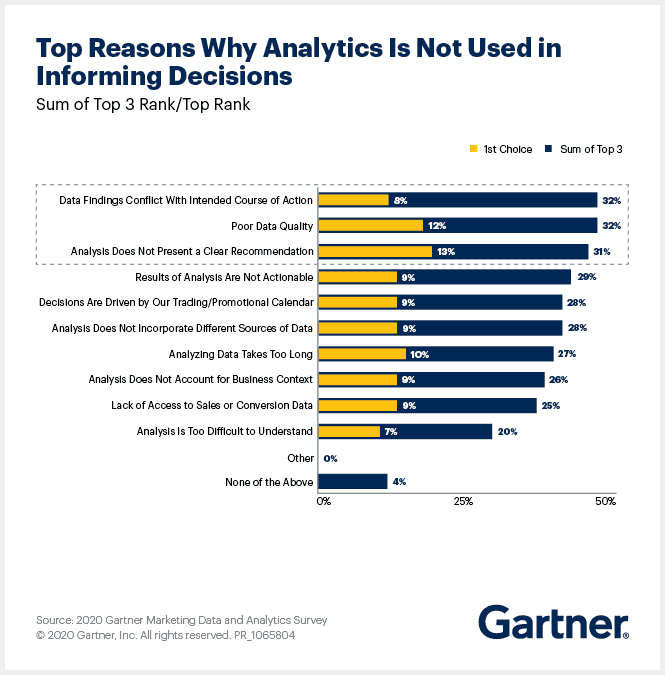To be more agile and adaptive in 2021, marketing leaders must prioritise four core competencies with a renewed focus that accounts for the unprecedented changes of 2020. Gartner says these core competencies that will help marketing to survive and thrive in 2021 include customer understanding, adaptive planning, data-driven decision making and strategic cost optimization.
“The real challenge now is understanding what the impacts of 2020 mean to your customers, your team, your business and your markets,” said Rick DeLisi, vice president analyst in the Gartner Marketing practice.
He added that to be more adaptive and agile in 2021, marketers must hone in on long valued core competencies with a fresh perspective and renewed focus.
Findings from Gartner research:
- The Gartner COVID-19 Concerns Tracker consumers have been most worried about the state of the economy, their family getting sick, and people not acting in the best interest of the wider community.
- The Gartner CMO Strategic Priorities Survey 2020 revealed more than a third of marketing leaders stated that their customers expect their brands to solve issues relating to the environment, gender equality, racism, and public health.
- Nine out of 10 marketing leaders have experienced a budget cut in 2020 – many of which have been severe – according to the Gartner Cost Optimization Survey 2020.
“For marketing leaders, it’s never been more important to anticipate their customer’s concerns and to reflect back to them how their brand helps to solve their customer’s issues,” said Cassandra Nordlund, director in the Gartner Marketing practice.
“This is a tall order even with a full marketing budget in hand. But now marketing leaders need to do this operating under more resource limits than before. This truly requires marketers to turn adversity into adventure.”
Cassandra Nordlund
To plan for an uncertain future and better ensure long-term growth for the organization, marketing leaders must prioritize four core competencies.
Customer understanding
Gartner says building meaningful brands in uncertain times requires a sense of what the brand means to your customers and stakeholders, and where marketers sit in the prevailing cultural context.
The Gartner CMO Spend Survey 2020 shows brand strategy is now one of the top most important capabilities in 2020.
Marketers must keep in mind that consumer values shift over time as they move through different life stages.
For example, throughout 2020 things have evolved quickly as the COVID crisis unfolded, the Black Lives Matter movement gained momentum, and political tension built around the U.S. election. This illustrates that a simple set-it-and-forget-it approach to segmentation and messaging will no longer suffice.
Adaptive planning
Building agile, adaptive planning enables marketing to respond, at speed, to both emerging opportunities and threats.
The Gartner Marketing Organization Survey 2020 reveals many marketing organizations are doing agile marketing. However, that same research shows that agile is more about project management methodology, rather than a planning mindset.
To succeed in 2021 and beyond, marketing leaders need to make a decisive move to agile, adaptive planning, so that strategy can respond and react to future shocks and ongoing business changes.
Data-driven decision making
Marketing data and analytics is now under the microscope as marketers are increasingly unimpressed by the results from analytics. The Gartner Marketing Data and Analytics Survey 2020 shows that only 54% of marketing decisions are being influenced by marketing analytics.

Poor data quality, inactionable results and nebulous recommendations are cited as the top reasons why marketing leaders shun analytics when making decisions.
For marketing to build truly adaptive, customer-orientated strategies, a renewed focus on data is critical. Marketing leaders must identify the handful of data points that allows them to course correct strategy, optimize operational plans and tactical execution.
This requires investments in skill development in the analytics team, increased automation of manual tasks that will free up valuable resources and time, and a fresh mandate for analytics as key influencers of the marketing leadership team and overall strategy.
Strategic cost optimization
Marketing is operating in a time of needs vs. wants, and budgets will likely continue to be constrained for some time to come.
A program of strategic cost optimization focuses on the returns marketing investments deliver to the enterprise. This allows marketers to better defend the most important costs and maximize the value of strategically important investments.
Marketing leaders should consider marketing’s costs as bundles of resources. For example, the sum of investments in media, agency and labour that fuel a campaign or project. From there, marketing leaders can build a forward-looking view of the returns that flow from each bundle of resources.
“As we look to the future, the challenges marketing leaders have faced in 2020 will continue to impact marketing in new and different ways,” said DeLisi.
“Marketers will need to continue to adapt, becoming more agile, digitally oriented and leaner than ever before.”
Rick DeLisi




